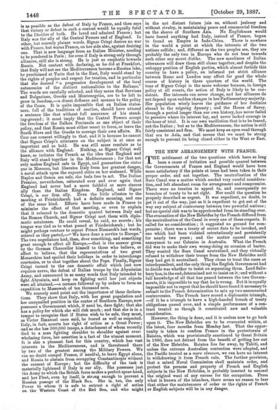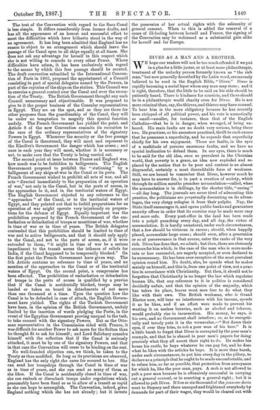THE NEW ARRANGEMENT WITH FRANCE.
THE settlement of the two questions which have so long been a cause of irritation and possible quarrel between the Governments of France and England would have been more satisfactory if the points at issue had been taken in their proper order, and not together. The neutralisation of the Suez Canal was a matter which needed very careful considera- tion, and left abundant room for arrangement and compromise. There were no treaties to appeal to, and consequently no breaches of treaty to be set right. Nor could the question be properly described as urgent. It was expedient, no doubt, to get it out of the way, just as it is expedient to get out of the way any subject of controversy between two powerful nations ; but no special risk was to be apprehended from its standing over. The evacuation of the New Hebrides by the French differed from the neutralisation of the Canal in every one of these respects. It called for no consideration ; it suggested no ground for com- promise; there was a treaty of recent date to be invoked, and one which had been violated ostentatiously and persistently for nearly two years ; and the matter caused excessive annoyance to our Colonies in Australia. What the French did was to make their own wrong-doing an occasion of barter. They wanted the Suez Canal neutralised, and they virtually refused to withdraw their troops from the New Hebrides until they had got it neutralised. They chose to treat the cases as interdependent, and the only thing the English Government had to decide was whether to insist on separating them. Lord Salis- bury has, in the end, determined not to insist on it; and without a full knowledge of all that has passed between the two Govern- ments, it is impossible to say that he is wrong. But it is equally impossible not to regret that he should have found it necessary to submit to the French determination to mix up two unconnected controversies. The French have scored a diplomatic triumph, —if it be a triumph to have a high-handed breach of treaty obligations passed over, and a simple performance of a con- tract treated as though it constituted new and valuable consideration.
However, the thing is done, and it is useless now to go back upon it. The New Hebrides are to be evacuated within, at the latest, four months from Monday last. That the oppor- tunity is taken to confirm France in the protectorate of Relates, which was provisionally sanctioned by Great Britain in 1880, does not detract from the benefit of getting her out of the New Hebrides. Raiatea lies far away, by Tahiti, and unless the extreme Andralian contention were adopted, and the Pacific treated as a mare olausunz, we can have no interest in withdrawing it from French rule. The further provision, that a mixed Naval Commission shall maintain order, and protect the persons and property of French and English subjects in the New Hebrides, is probably inserted to conceal the original want of any excuse for the occupation. From what is known of the islanders, there seems no reason to fear that either the maintenance of order or the rights of French or English subjects will be in any danger. The text of the Convention with regard to the Suez Canal is less simple. It differs considerably from former drafts, and has all the appearance of an honest and successful effort to meet the difficulties which have hitherto stood in the way of an agreement. It has long been admitted that England has no reason to object to an arrangement which should leave the passage of the Canal open to all ships equally at all times. She does not ask any advantage for herself in this respect which she is not willing to concede to every other Power. Where difficulties have arisen, it has been exclusively with regard to the means by which this free passage should be secured. The draft convention submitted to the International Conven- tion of Paris in 1885, proposed the appointment of a Council consisting in part of special delegates named by the Powers, in part of the captains of the ships on the station. This Council was to exercise a general control over the Canal and over the execu- tion of the Treaty. The British Government thought any such Council unnecessary and objectionable. It was proposed to give to it the proper business of the Consular representatives in Egypt. They are on the spot, and as they are there for other purposes than the guardianship of the Canal, they will be under no temptation to magnify this special function unduly. The French Government has yielded the point, and Article 8 of the new Convention commits its execution to the care of the ordinary representatives of the signatory Powers in Egypt. Whenever the security or the free passage of the Canal is threatened, they will meet and represent to the Khedive's Government the danger which has arisen ; and once in each year they will meet, whether it is necessary or not, to make sure that the Treaty is being carried out.
The second point at issue between France and England was, how much was to be forbidden to belligerents. The English Government proposed to prohibit the " stationing " by a belligerent of any ships-of-war in the Canal or its ports. The French Government wished to prohibit all acts of war, and all acts "directed immediately to the preparation of an operation of war," not only in the Canal, but in the ports of access, in the approaches to it, and in the territorial waters of Egypt. The English Government objected to any reference to the " approaches " of the Canal, or to the territorial waters of Egypt, and they pointed out that to forbid preparations for an operation of war might operate very injuriously on prepara- tions for the defence of Egypt. Equally important was the prohibition proposed by the French Government of the em- barkation or debarkation of troops or munitions of war, whether in time of war or in time of peace. The British delegates contended that this prohibition should be limited to time of war and to active belligerents, and that it should only apply to the Canal, and not to the ports of access, as, if it were extended to them, "it might in time of war be a serious impediment to the transit across the isthmus of reliefs for India, if the Canal happened to be temporarily blocked." On the first point the French Government have given way. The 5th Article contains no reference to time of peace, and no mention of the approaches to the Canal or of the territorial waters of Egypt. On the second point, a compromise has been effected. The prohibition of embarkation or debarkation of troops in the ports of access is qualified by a proviso that if the Canal is accidentally blocked, troops may be landed or taken on board in detachments of not more than one thousand at a time. Upon the question how the Canal is to be defended in case of attack, the English Govern- ment have yielded. The rights of the Turkish Government have been, in the opinion of the British Government, unduly limited by the insertion of words pledging the Porte, in the event of the Egyptian Government proving unequal to the task, to take counsel with the signatory Powers. Bat as the Otto- man representative in the Commission sided with France, it was difficult for another Power to ask more for the Sultan than he thought fit to ask for himself; and Lord Salisbury consoles himself with the reflection that if the Canal is seriously attacked, it must be by one of the signatory Powers, and that in that case the Convention will cease to be binding on the rest. No well-founded objection can, we think, be taken to the Treaty as thus modified. So long as its provisions are observed, England has the only right she cares for secured to her. She can send her troopships through the Canal in time of war as in time of peace, and she can send as many of them as she likes. If the Canal is accidentally closed in time of war, she can embark or disembark troops under regulations which presumably have been fixed so as to allow of a transit as rapid as she can hope to accomplish. The Convention, indeed, gives England nothing which she has not already ; but it invests the possession of her actual rights with the solemnity of general consent. When to this is added the removal of a cause of ill-feeling between herself and France, the signing of the Convention may be welcomed as a substantial gain alike for herself and for Europe.



































 Previous page
Previous page